On this page:
- School history
- Curriculum
- Bilingualism and linguistic education
- Teachers
- Students
- Special programs
- Extracurricular activities
- The uniqueness of the school
- Plans for the future
- Achievements
- Challenges and difficulties

School history
Our Kids: Did both your preschool and elementary school start at the same time?
MM: No, first we opened the preschool, and then eight years later, our elementary school. We wanted our preschool graduates to continue their education with us and the parents really appreciated our approach to education. Many parents asked us to consider opening an elementary school. Those eight years of experience made it possible for us to create a very cohesive concept of our elementary school. When some parents found out that we had launched the elementary school, they started moving children, and so some of our former students came back to us after a few years.
Curriculum
Our Kids: Why did you choose the British curriculum?
MM: Because it was relatively easy to adapt to our needs. We implemented the Polish curriculum in full, and we needed another international one, and because the British curriculum is relatively uniform across all of Great Britain, it was very well suited to our needs. In the US, teaching curricula are very different, even within the same state. Another thing it offers is easy access to textbooks and teaching guides and materials. This is a European market, so it’s easy to get books from Great Britain: they reach us in just two weeks. Publishing houses have a wide variety of materials for the country inhabited by 60 million people.
Bilingualism and linguistic education
Our Kids: Your school is bilingual. Do children study in both languages?
MM: I specialize in English-language teaching methodology, and I’m also a practitioner with over 20 years of experience, so my big dream was for the children who are Polish and who live in Poland—even if they come from other countries—to be bilingual. We decided that we don’t want to open another international school similar to those already on the market. In our school, the Polish curriculum is implemented in full, which gives the parents the comfort of knowing that in case of a financial or life-situation change their child would easily be able to transfer to the public educational system. We want our Polish children to get their full Polish education. For me, with my EFL experience, it was important to see that the children get bilingual education as early as possible, and to ensure they get exposure to another language from their earliest age. And so in our system, children, after just a few years of attending our school, are bilingual.
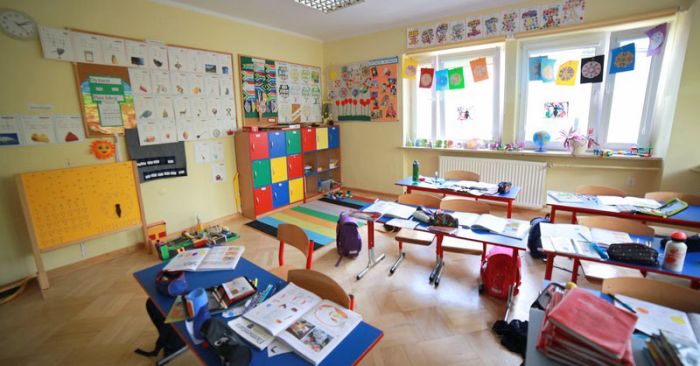
Our Kids: How do you manage to achieve that?
MM: Creating the curriculum took me a few months and was a big challenge. It was impossible to have two full curricula, because the children would have to stay at school from 8 am to 6 pm. Our program involves the full Polish curriculum with as many hours required by the ministry of national education, to which we add a 12 -hour weekly module of the British curriculum taught exclusively by native speakers of English. And those 12 extra hours a week are enough for our students to be fully bilingual after 2 to 3 years.
Our Kids: What does this look like from the logistic point of view?
MM: Each day is divided into two parts: one is where Polish teachers teach the Polish curriculum, and the other with native speakers of English teaching the British curriculum.
Our Kids: When does this system start?
MM: From the beginning of elementary school.
Our Kids: And what about your preschool?
MM: In our preschool, we have obviously fewer educational hours in accordance with the ministry’s guidelines. This is because of their attention span at this age. Of course, children have many other activities, e.g., gymnastics, music, and of course English is “smuggled in” everywhere in many different forms.
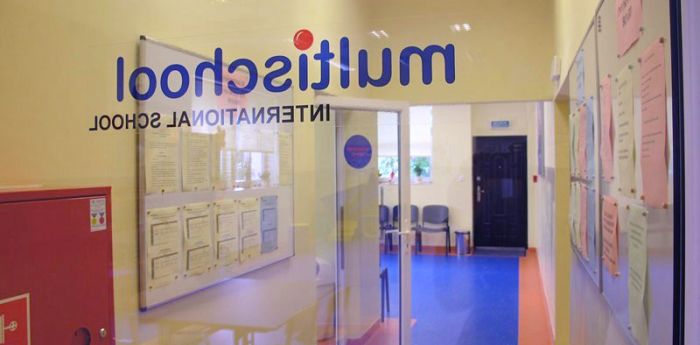
Our Kids: So bilingualism is possible to achieve after two or three years of elementary school education?
MM: Yes, sometimes I visit classes myself and when I speak to the students in English, I’m always incredibly impressed with their English skills. For me, who was actively involved in creating this program, this is the most rewarding experience and an incredible reward for my work. Sometimes when parents come to enrol their children, I take them to a class to show them what children achieve after a few years of study in our school.
Our Kids: What do you think is the reason for this success?
MM: I think it’s definitely thanks to our very cohesive, well-developed curriculum and very carefully chosen teachers who are also supervised by us in terms of methodology.
Our Kids: English is not the only foreign language taught in your school, is it?
MM: We also have German, French, and Spanish, which are taught less intensively.
Teachers
Our Kids: You said the implementation of the British curriculum is done by native speakers. Apart from being native speakers of English, are they also qualified teachers?
MM: Oh yes, they are, but because they were educated in other countries and other educational systems, we ourselves make sure that they go through our own training. They can be very highly qualified teachers of some subjects, but teaching English as a foreign language may pose a difficult challenge for them. Also, all our other teachers undergo regular training to improve their qualifications.
Our Kids: Do you manage to keep those teachers because, as we know, very high teacher turnover is a big problem in Polish education?
MM: We’re quite successful at this. Many of our teachers live in Poland—they have partners here, they’ve started families, and settled in our country. For us, those teachers are very precious and we’re very happy to be working with them.
Our Kids: Where do they come from? Are they mostly British?
MM: Not only. We have teachers from many countries: New Zealand, the US, Canada, and Great Britain, so English-speaking countries are fully represented and our students have exposure to various accents and varieties of English.
Students
Our Kids: Who are your students?
MM: About 40% of our students are children coming from families where one of the parents comes from a country other than Poland or from international families. Altogether we have students from 45 countries: Taiwan, Thailand, China, Vietnam, and of course from all over Europe. We even have American students.
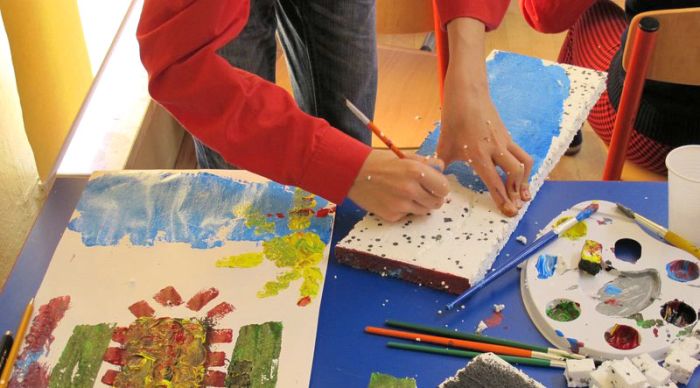
Our Kids: We’ve talked about the teacher turnover—does that also refer to students who come with their parents for a short time and have to leave Poland?
MM: This is a rather marginal issue, unlike in British or American schools where there are mostly expat families and where there’s a lot of change in the student population. This is a problem because after two to three years, most students in every class are new. That’s not the case in our school where classes mostly consist of the same students.
Special programs
Our Kids: On your website, you mention a number of your own educational programs such as Multiworld, Multisport, Multichallenge, and Multiknowledge. Could you tell us about the one that you’re particularly happy with?
MM: It is definitely the program called Multiworld. Through this program we implement various educational projects where children in their own age groups (Grades 1-3, 4-6, and 7-8) prepare their own projects. In most cases a new program starts in September and is carried out throughout the year. It has three coordinators—one in each age group. Within one project we have various activities and the children prepare various elements by themselves, for example, theatre performances which relate to that leading theme.
Our Kids: Could you give me an example?
MM: Now, since September, we have been implementing the project called multiculturalism. We want our children to think about what it means, how multiculturalism works, why it’s worth considering and important in our community, and why it is that the fact that we differ from each other is a positive thing.
In our school, we have children coming from a variety of races, ethnicities, and religions, so this topic is of particular relevance. For instance, one of the elements of this project was our oriental food day. All the children coming from Asia prepared dishes typical of their countries. Everybody tasted them and the idea proved to be extremely popular. In higher grades, students organize a theatre day. Kids also visit museums because it’s important to us that the project is implemented also through trips outside the school. There’s also a film project with the kids, for example, watching films directed by Korean filmmakers.
All this is related to the multiculturalism program. At the end of the year we will summarize this program and talk about how the fact that we are all different, that we speak different languages, and that we come from various religious and ethnic groups is something like an extra bonus, and something that makes us happy and enriches us. We also involve parents in this project.
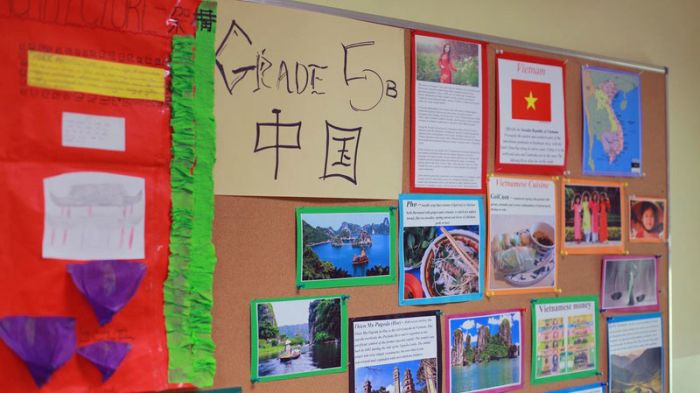
Extracurricular activities
Our Kids: Your extracurricular activities begin very early, as early as preschool, with the so-called clubs.
MM: Yes, this is all about stimulating children’s interests. Different kids are interested in different things: some are into robotics, others are into chess or martial arts. By attending these activities, the kids can also check if they’re really interested in something that initially looked very attractive. Some clubs are very dynamic, for example, sports, some of a more static nature, for example. the reading club or the German language club.
There are no extra fees for these activities and they’re often run by teachers who are truly passionate about them. They are extremely popular. We have some clubs where children have to register a year in advance, for example, our cooking club, where children cook and bake cakes. It’s extremely popular, and although we increased the number of spots and doubled our hours, we still have more kids interested than we have spaces to offer.
The uniqueness of the school
Our Kids: In what way is your school different from others? What is special about it?
MM: I think that our strength is good management. Throughout these years, we have managed to create a group of people who manage the school very well. It’s not just only me, but also the principal, the English-language education director, the administrative director, the ladies who run the office, and the people who are involved in organizing school life. In my opinion, it’s extremely important to make all the details work: for the teachers to know what they’re supposed to do, to make sure everything is on time and everything is clear and transparent. I think this makes us special and I hear that from the parents as well.
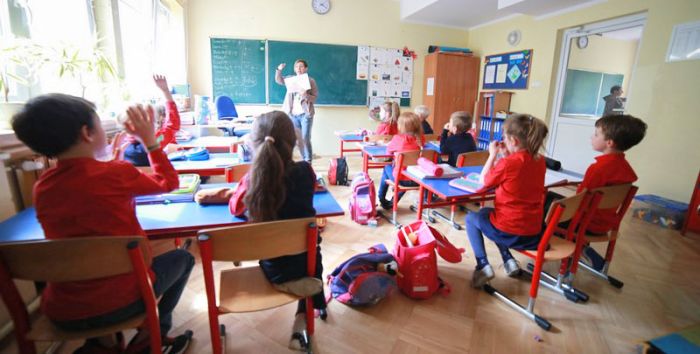
Plans for the future
Our Kids: Are you planning to expand the school and create your own high school?
MM: Oh yes, certainly. We are now looking for a building. Unfortunately, the regulations regarding educational buildings have changed, so it’s very difficult. According to the new rules, some parts of the city are off limits because you cannot open schools there. But we will open our own high school because the parents want their children to be able to continue education in our own institution.
Our Kids: Do you keep track of what graduates do? Do you know where they land?
MM: They often come to visit us and share good memories of our school, telling us how wonderful it was and how much they appreciated it. This is why we really want to open our own high school. I’m sure that many of our students will stay with us.
Achievements
Our Kids: What are you most proud of?
MM: I'm proud of our students’ bilingualism and of the fact that Polish students, without any loss to the Polish curriculum, are able to achieve bilingualism. This is fantastic and I am extremely proud of this!
Challenges and difficulties
Our Kids: Do you encounter any difficulties in your work?
MM: Now, after the educational reform, it’s difficult to get good Polish teachers. Our school is expanding, but sometimes teachers take maternity leaves or retire, and to get new experienced Polish teachers, e.g., in Polish or mathematics, is extremely difficult and sometimes takes a few months. Schools compete for these good teachers. This is the biggest challenge right now. It’s much easier to find teachers who are native speakers.
People who read this also viewed:
- Warsaw private schools
- Kraków private schools
- Poznań private schools
- Wrocław private schools
- Łódź private schools
- Rzeszów private schools
- Gdańsk & Gdynia private schools
-
Advice Guide
- ABC of educational terminology: Glossary of terms and concepts
- The admissions process
- Advantages and disadvantages of studying in an international school
- The application process
- Benefits of Polish private schools
- Bilingual schools
- Boarding schools
- Choosing a private or nonpublic school in Poland
- Compare schools in Poland
- English schools in Warsaw
- Homeschooling
- International schools in Kraków
- International schools
- Private school interviews
- Music education
- Myths about private education
- Non-public schools in Poland
- School open houses
- Our Kids Interview: Get to know EF Academy Oxford
- Our Kids Interview: Get to know Open School
- Our Kids interview: Get to know Regent College International Schools
- Our Kids Interview: Get to know The American School of Warsaw
- Our Kids Interview: Get to know The British School Warsaw
- Our Kids Interview: Get to know Wrocław Cosmopolitan School (two interviews, new video)
- Poland school profiles
- Private day schools
- Gifted schools & programs
- Private Jewish schools in Poland
- Language schools
- Private school tuition and costs in Poland
- Private schools in Poland
- Private schools in Poland offering French-language immersion
- English immersion schools
- Poland school uniforms
- Private special needs schools in Warsaw
- Public versus non-public schools in Poland
- Private school questions
- Private school rankings
- Reasons for choosing private schools - Our Kids’s survey report
- Religious schools
- Schools and classes for children with ADHD in Poland
- Social primary schools
- Social Schools
- Special educational needs (SPE) certificates
- Special needs schools
- Study abroad at a private school
- The first annual non-public school fair in Poland
- The first annual Our Kids non-public school expo in Warsaw was a great success
- Third Private School Expo in Warsaw - summary
- Types of schools
- Types of schools in Warsaw
- Warsaw preschool costs
- Why private school?
- Why parents go private
-
Grades
- Boarding high schools
- Choosing a high school in Poland
- Mokotow High School Campus - a new Warsaw high school and Thames British School campus
- Montessori nursery schools
- Montessori preschools
- Our Kids Interview: Get to know English Montessori School Katowice
- Our Kids Interview: Get to know FSA School
- Our Kids Interview: Get to know KIDS & Co.
- Our Kids Interview: Get to know Polish British Academy of Warsaw
- Our Kids Interview: Get to know The English Playhouse and The English Primary
- Poland education: grade levels
- Preschools in Warsaw
- Private & non-public preschools
- Private & non-public primary schools
- Private bilingual elementary schools in Warsaw
- Private high schools
- Private high schools in Warsaw
- Private middle schools
- Nursery schools
- Private primary schools in Warsaw
- Social high schools
-
Locations
- Boarding schools in Warsaw
- English schools in Kraków
- International Baccalaureate (IB) schools in Warsaw
- International schools in Warsaw
- Montessori schools in Warsaw
- Non-public schools in Warsaw
- Our Kids Interview: Get to know EF Academy
- Our Kids interview: Get to know Excellence in Education better
- Our Kids Interview: Get to know PRIMUS Non-Public Primary School No. 47 and Non-Public Secondary School
- Our Kids Interview: Get to know the Canadian School of Warsaw
- Our Kids Interview: Get to know The Primary and Secondary Schools of the Sisters of Nazareth in Warsaw
- Private Catholic and Christian schools in Warsaw
- Private day schools in Warsaw
- Private language schools in Warsaw
- Private schools in Bialystok
- Bydgoszcz schools
- Częstochowa schools
- Private schools in Gdańsk & Gdynia
- Katowice schools
- Private schools in Krakow
- Lublin schools
- Olsztyn schools
- Private schools in Poznań
- Private schools in Rzeszów
- Szczecin schools
- Private schools Warsaw
- Private schools in Wrocław
- Zielona Góra schools
- Private schools in Łódź






 POL
POL CAN
CAN